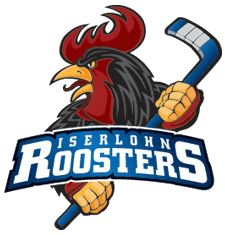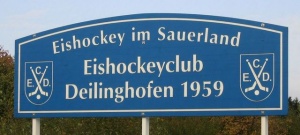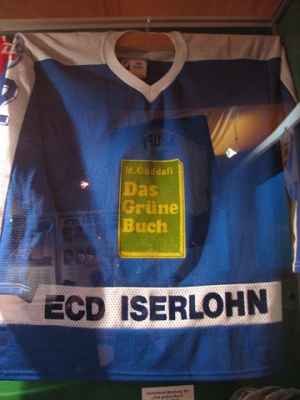Iserlohn Roosters
| Iserlohn Roosters | |
|---|---|
| City | Iserlohn, Germany |
| League | Deutsche Eishockey Liga |
| Founded | 1959 |
| Home arena | Eissporthalle Iserlohn |
| Colors |
Red, White |
| Franchise history | |
| 1959-1979 | EC Deilinghofen |
| 1979-1988 | ECD Iserlohn |
| 1988-1994 | ECD Sauerland |
| 1994-2000 | Iserlohner EC |
| 2000-present | Iserlohn Roosters |
main
The Iserlohn Roosters are a professional ice hockey team based in Iserlohn, North-Rhine-Westphalia. They are members of the Deutsche Eishockey Liga since 2000 and play their home games at the Eissporthalle Iserlohn which is also known as Eissporthalle am Seilersee. Playing fifteen years in the DEL, the team made the playoffs three times.
History
The history of ice hockey in Iserlohn began in the neighbouring town of Hemer. Canadian soldiers were deployed to a district of Hemer called Deilinghofen. They came to the town after the end of the Korean War in 1953 and soon built an arena - first without a roof. The teenagers in Deilinghofen were interested in this strange kind of sport and wanted to play it, too. They played on streets or frozen ponds, and were allowed to play in the arena in 1957 for the first time. Recognizing the joy of the teenagers, they got coaches with Charles McCuaig later becoming a steady trainer. After a long preparation time, the first game against a Canadian youth team from Soest was on 8 March 1958 in front of 120 people. Deilinghofen played well, but lost 2-6. The equipment was borrowed from the soldiers. After that game, the matches were more steady and with more bystanders, so the arena had to get a roof in 1958.
EC Deilinghofen (1959–1980)
On 28 February 1959 EC Deilinghofen was founded. In 1959 a team from Deilinghofen started in a junior league and reached second place. A year later they took part in the German championship and finished fifth. In the second season, 1960–61, they came in first in North Rhine-Westphalia and were the second best team in the country. Between 1962 and 1964, they were champions of the north of Germany, but they lost the playoffs against the champions of the south. So, they missed promotion, although they were eventually promoted.
In 1971 the Canadian soldiers were sent home, and the new British soldiers were not interested in ice hockey. So, the team had to search for a new home. Local politicians wanted to have an arena in Iserlohn. After the agreement of Iserlohn's town council, the Eissporthalle am Seilersee was built.
In the 1976–77 season, Deilinghofen finished two places behind Kaufbeuren in the new Zweite Bundesliga. However, Kaufbeuren waived their right to promotion, and Deilinghofen got the chance to play in Germany's top hockey league for the first time.
ECD Iserlohn (1980–1987)
In 1980 the club was renamed ECD Iserlohn because the arena had been there for years. In the following season, the team was relegated for the first time in its history. Two years later, it moved back up again. And, the next years were the best and most successful seasons in the club's history. In 1986 ECD reached the semi-finals in the playoffs with stars like Jaroslav Pouzar and Martti Jarkko. But, these players also cost a lot. The team president, Heinz Weifenbach, looked for help in Libya, where Muammar al-Gaddafi agreed to pay money if the team advertised his "Green Book".[1] On 4 December 1987 they came to an agreement. However, a few days later, ECD scrapped that plan.[2]
ECD Sauerland (1988–1994)
The next season, ECD Sauerland was founded. They started playing in the Oberliga, although Weifenbach wanted to begin in the Bundesliga. The club had the same, big financial problems as its predecessors. The 1991–92 season was a catastrophe, so the fans were afraid that the team would not receive a license to continue operating. ECD did get the license, but eventually went bankrupt a few days after the end of the 1993-94 season.
ECD Sauerland Iserlohn Penguins (1994)
Only one day later, on 9 April 1994, the ECD Sauerland Iserlohn Penguins were founded, but the pewee players didn't contract in, so the club didn't have a chance to survive.
Iserlohner EC (1994–2000)
Iserlohner EC (IEC) was founded on 20 April in the same year. The new committee wanted to avoid financial adventures. After one season, the team moved up to the second best league. The following two years were more difficult, but new players during the season revived the club. In 1997 a new coach came to Iserlohn: Greg Poss. After three successful years, the club could move up again because they bought the license of Starbulls Rosenheim. 40 years after the foundation of the team, the arena in Deilinghofen was torn down in 1999. Many people from Deilinghofen protested against this.
Iserlohn Roosters (since 2000)
Iserlohner EC joined the Deutsche Eishockey Liga in 2000 and adopted the name Iserlohn Roosters. A GmbH, which administrates the finances and the organisation, was created for the professional team . The GmbH was named the Iserlohn Roosters GmbH. All junior teams were still under the control of the IEC. The Roosters continually had the lowest budget of all DEL teams, and the media often referred to them as an underdog. In their first two seasons, the Roosters placed 15th and 12th.
In the 2002–03 season, the team again missed the playoffs by falling just two points short even though they beat the German champion of the year, the Krefeld Pinguine, 8-1 on the last day of the season. Before the next season, Poss left the club and went on to coach the Thomas Sabo Ice Tigers. Iserlohn named Dave Whistle as new coach, but after only nine games, Doug Mason was his successor. In the lockout season in 2004–05, Mike York and John-Michael Liles came to Iserlohn and helped the team reach 11th place despite still having the smallest budget in the league. York signed with Iserlohn after his old college friend Bryan Adams, who was the captain of the Roosters, talked to him. Brian Gionta also signed, but left without having played because of his wife's pregnancy.
Twelve players left the club in the summer of 2005, but the Roosters were able to make some great moves on the transfer market with the biggest signings being former DEL top scorer Brad Purdie and former NHL player Mark Greig for two years. Nevertheless, they finished in just eleventh place despite having the best power play in the league. In March 2006, Mason left Iserlohn for Kölner Haie, and Geoff Ward came to Iserlohn to coach. After defeating the DEG Metro Stars 5-1 in the opening game of the season in 2006-07, the Roosters were in first place for one week for the first time in their history. After again finishing another season in eleventh place, Ward then left Iserlohn during the summer of 2007 to be an assistant coach for the Boston Bruins of the NHL.
For the 2007-08 season, the new coach of the Roosters was Rick Adduono. The Roosters improved the team with Norm Maracle and Bob Wren. After the fifth game, they were in a playoff position and were able to keep it the rest of the season. Improved offense was due to Robert Hock and Michael Wolf starting to dominate the league as native players, which broke the dominance of North American players. Wolf was the top goal scorer, and Hock became league top point scorer. The third man in their line was either Tyler Beechey, who was first signed on a try-out.contract, or Brad Tapper. Also the line with Jimmy Roy, Pat Kavanagh and Ryan Ready helped to unexpectedly reach the playoffs. However, in the quarterfinals they were defeated by the Frankfurt Lions in game 7.
For the next season, the Roosters signed former New York Islanders coach Steve Stirling. The team failed to continue the way they had the year before, and Stirling was fired in February after the team fell out of playoff position. In the summer many players voiced their critique of Stirling. Assistant coach Ulrich Liebsch became the new head coach. Many key players left the team. Due to the global financial crisis at that time, the Roosters announced that they would look for young, talented players and wouldn't focus on veterans for the 2009-10 season.
Season-by-season records
| Season | Games | Won | Lost | Tie | OTL | SOL | Points | Goals for |
Goals against |
Rank | Playoffs |
|---|---|---|---|---|---|---|---|---|---|---|---|
| 2000–01 | 60 | 23 | 31 | 0 | 6 | - | 68 | 152 | 189 | 15 | Did not qualify |
| 2001–02 | 60 | 23 | 28 | 0 | 9 | - | 74 | 154 | 183 | 12 | Did not qualify |
| 2002–03 | 52 | 25 | 19 | 8 | 0 | - | 75 | 142 | 132 | 9 | Did not qualify |
| 2003–04 | 52 | 19 | 26 | 0 | 7 | - | 59 | 137 | 169 | 12 | Did not qualify |
| 2004–05 | 52 | 21 | 26 | 0 | 5 | - | 64 | 138 | 156 | 11 | Did not qualify |
| 2005–06 | 52 | 21 | 26 | - | 0 | 5 | 65 | 166 | 178 | 11 | Did not qualify |
| 2006–07 | 52 | 24 | 24 | - | 1 | 3 | 70 | 148 | 163 | 11 | Did not qualify |
| 2007–08 | 56 | 33 | 18 | - | 4 | 1 | 96 | 208 | 196 | 5 | Lost in quarterfinals |
| 2008–09 | 52 | 22 | 18 | - | 5 | 7 | 71 | 171 | 187 | 11 | Did not qualify |
| 2009–10 | 56 | 26 | 26 | - | 3 | 1 | 74 | 166 | 183 | 11 | Did not qualify |
| 2010–11 | 52 | 21 | 22 | - | 5 | 4 | 68 | 150 | 159 | 12 | Did not qualify |
| 2011–12 | 52 | 25 | 19 | - | 4 | 4 | 77 | 150 | 150 | 10 | Lost in playoff qualifications |
| 2012–13 | 52 | 20 | 29 | - | 2 | 1 | 59 | 130 | 167 | 13 | Did not qualify |
| 2013–14 | 52 | 19 | 22 | - | 2 | 3 | 74 | 147 | 149 | 10 | Lost in quarterfinals |
| 2014–15 | 52 | 28 | 17 | - | 4 | 3 | 86 | 179 | 150 | 6 | Lost in quarterfinals |
| 2015–16 | 52 | 23 | 12 | - | 6 | 6 | 91 | 162 | 143 | 3 | Lost in quarterfinals |
References
- ↑ Serge Schmemann. "Qaddafi Foiled as an Ice Hockey Patron", The New York Times, 18 December 1987. Retrieved on 26 August 2011.
- ↑ Gabriel Luis Manga. "The forgotten story of … Muammar Gaddafi's German ice hockey team", The Guardian, 1 February 2016. Retrieved on 22 April 2013.
| This page uses Creative Commons Licensed content from Wikipedia (view authors). |


